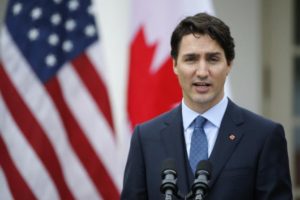Refugees in North America – a tale of two states
As the US sinks into a toxic debate about whether to let Muslim refugees into the country, its northern neighbour has set about welcoming tens of thousands of Syrians.
Newly elected Canadian Prime Minister Justin Trudeau announced last year Canada would allow 25,000 refugees to resettle in the nation by February this year. Another 25,000 will arrived by the end of 2016.
The plan gives priority to women, children, families and persecuted groups such as lesbians and gays.
Canada’s policy comes in sharp contrast to the United States, where Republican frontrunner Donald Trump called for a ban on letting Muslims into the country and 30 governors have vowed to bar Syrian refugees from resettling in their states over fears that Islamic extremists may be hiding among them.
“The US is concerned about extremists… therefore it processes in a much more careful manner,” said Canadian refugee advocate Kyle Matthews.
“In Canada’s case, this is a political promise in an election,” he said.
Trudeau, who won a majority government in October, campaigned on a promise to resettle thousands of refugees.
The pledge gained traction after photos showed a 3-year-old Syrian boy Kurdi’s body washed up on the shores of a Turkey beach. His family had been trying to gain asylum in Canada.
While he’s studiously avoided commenting on the US presidential race, the Canadian leader did take a thinly veiled swipe at Trump’s proposals recently.
“I don’t think it comes as a surprise to anyone that I stand firmly against the politics of division, the politics of fear, the politics of intolerance or hateful rhetoric,” he said.
“Muslims are the greatest victims of terrorist acts around the world. Painting ISIS and others with a broad brush that extends to all Muslims is not just ignorant, it’s irresponsible,” Mr Trudeau said.
But Canada’s refugee policy has not been met with universal acceptance by Canadians, who appear split on allowing refugees into their country.
A poll late last year showed 48 per cent supported resettling refugees while 44 per cent were opposed.
Hundreds of Canadian citizens and organizations, including numerous churches, have committed to sponsoring refugees, which involves providing housing, clothing and other expenses for a family for at least a year.
Meanwhile, the US which has promised to take 10,000 Syrian refugees, is struggling to settle any in meaningful numbers.
To date, the US has accepted only 1,285 new refugees, according to new data released by the State Department.
That represents just 13 per cent of refugees that the US has agreed to accept, even after Secretary of State John Kerry pledged to step up its commitment to protect the families fleeing from Syria’s six-year civil war.
Republican governors and presidential candidates have turned Syrian refugees into a political target in the face of mounting public fear over a string of horrific terror attacks. Questioning the strength of the vetting process that refugees face, some have actively tried to block newcomers from entering the US.
A handful of states are fighting the courts for the right to ban refugee resettlement. Congress, meanwhile, has mulled various measures to ensure that the refugees able to resettle are moving to regions where they are unwelcome.
The heated opposition to resettling Syrian refugees is at odds with humanitarian advocates who say the US should play a greater role in handling the crisis abroad.
The administration’s pledge represents a minuscule fraction of the total 4.8 million Syrian refugees in need of resettlement. Many feel the U.S. should be accepting even more.
“The US has not been leading on the resettlement of Syrian refugees for several years,” said Eleanor Acer, senior director of refugee protection at Human Rights First (HRF).
HRF has released a study targeting the staffing deficiencies and bottlenecks that have hamstrung the process of bringing a steady flow of refugees throughout the year.
Trudeau’s relationship with the American government has so far been amicable, but his approach to refugees could result in growing tension between the two nations.
Observers say that conservatives in the US see Canada’s immigration policy as too liberal and its borders too porous.
“There’s a fundamental chasm across the entire western world between left and right on immigration, refugees and particularly Muslims,” Mr Matthews said.
Laurie Nowell
AMES Australia Senior Journalist












